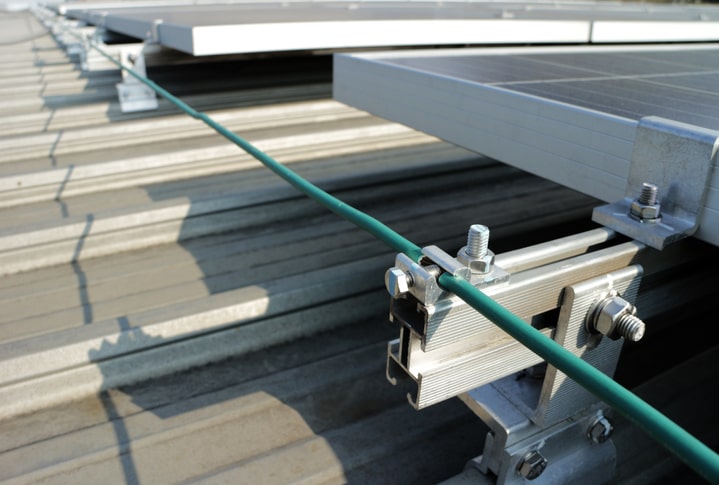Should You Ground Your Solar Panels?

Solar panels can be dangerous if they are installed without any earthing or also know a grounding system. Therefore, you need to make sure all new installations have been done safely by installing properly grounded solar panels and wiring them up correctly.
It is critical to properly install solar power systems to ensure that electricity flows through the path it is intended to flow. Otherwise, it can create a safety hazard and shorten the life of your installation.
In this post, we discuss why earthing your solar panel may be necessary for a good connection and then go on to explain how earthing works in more detail so you know how it is done.
What is earthing and why do solar panels need it?
Earthing is a way of making sure that electricity doesn't flow off your equipment randomly and becomes a safety hazard. It introduces a shortcut to any potential leakage of electricity, which is ground, to provide a safe path to discharge.
If earthing (also known as grounding) is ignored during the system installation, electricity can flow in any direction and create a lot of problems. Here are the most important reasons you should consider earth your solar panel installation.

1-Protects against shocks
Electrical shock happens when the body becomes part of the electric circuit, either when a human comes into contact with solar panels or its wiring installation. A properly installed earthing protects against potential shocks and electrocution.
2-Prevents equipment malfunctions and fires
Equipment that is not properly grounded may malfunction and cause fires.
If a system is not grounded and there are any flammable liquids nearby, static electricity may cause them to light upon contact with the panels or wiring installation. This could lead to an explosion and fire hazard.
3-Protects against lightning strikes
The earth offers a safe path for excess current caused by lightning strikes. A properly grounded solar power system can reduce the risk of damage and outages from lightning strikes.
4-Regulations mandates so
There is a complex set of regulations in the United States to ensure that PV systems meet specific safety criteria.

All exposed or accessible equipment and circuits in these installations must be properly connected to earth ground using specified methods and equipment, according to the National Electrical Code (NEC).
Grounding concerns arise as installed PV systems age, posing a threat to system safety. These concerns include failing electrical connections, insufficient grounding device design and installation, and the consequences of non-code compliance system installations.
Many of the essential ground-fault prevention devices in use today do not detect all conceivable ground faults, and in certain circumstances, undiscovered ground faults have caused fires and equipment damage.
Many of these issues are being addressed by revising the NEC and Underwriters Laboratories (UL) hardware safety criteria for device certification/listing.
The NEC mandates that all electrical equipment be inspected for safety by the authority having jurisdiction (AHJ or electrical inspector).
The Nationally Recognized Testing Laboratory (NRTL) evaluation, certification, and listing procedure has largely standardized electrical equipment in terms of input/output interconnection.
The NRTL certification guarantees that the equipment complies with all applicable safety regulations.
Types of earthing (grounding)
Before we go into the topic of grounding, let's define the term “grounding.” In electrical and PV systems, there are two forms of grounding: equipment grounding and system grounding.
Equipment Grounding
Equipment grounding is sometimes known as protective earthing or safety grounding. The equipment grounding system electrically connects all exposed non-current carrying metal portions of the electrical system, eventually connecting them to the earth (ground).
Insulation or mechanical problems can cause metal enclosures housing electrical conductors or other electrical components to become electrified. Metal surfaces that have been energized, such as the metal frames of PV modules, can cause electrical shock and fire.
By effectively connecting exposed metal surfaces collectively and to the earth, the potential difference between the earth and the conductive surface during a fault situation is lowered to near zero, lowering the risk of electric shock.
Because the majority of the surroundings (including most conductive surfaces and the earth itself) are at earth potential, correct connecting to earth by the equipment grounding mechanism is critical.
Equipment grounding conductors are the conductors that are utilized to connect several exposed metal surfaces (EGCs).
The equipment grounding system in a traditional electrical power system (utility, generator, or battery generated) offers a conduit for ground-fault currents to return to the energy source.
Allowing these currents to flow to the source as quickly as possible allows appropriately positioned overcurrent protection devices (OCPDs, often fuses or circuit breakers) to activate, removing the source of the leakage current.
System Grounding
In system grounding, one of the circuit conductors is bonded to both the equipment grounding system and to earth. The grounded conductor is the circuit conductor that is connected to the equipment grounding system and to the earth.
The system bonding jumper is the NEC's term for the link between the grounded conductor and the equipment grounding system.
Conclusion
Photovoltaic power systems provide clean, renewable energy to homes and businesses.
To ensure safety for the public during extended periods of time, PV systems must be designed with high standards in mind by professional engineers who are qualified to do so.
Earthing solar PV systems create a complete circuit by safely connecting any potential leakage of electricity to the ground so that there is no chance of an electric shock or other safety hazard occurring.
So what should you do? Speak with your solar panel provider about grounding installations.
If your solar power system already has grounding make sure it is in good shape by getting a professional inspection preferably from a certified engineer or electrician.